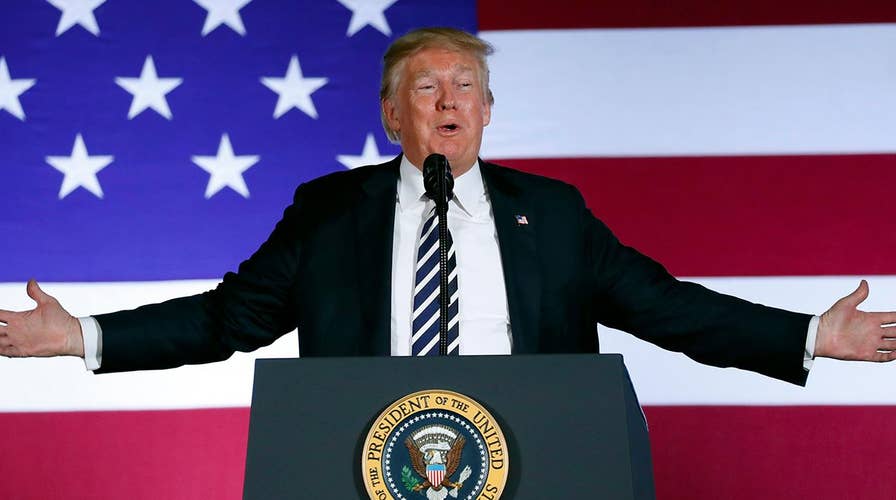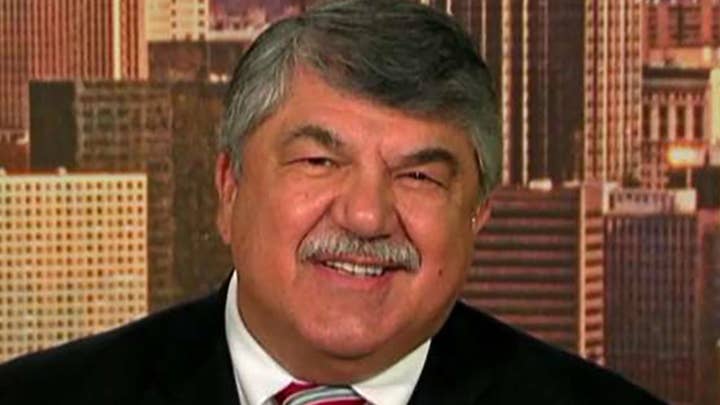Trump calls out Canada, NAFTA as trade battle heats up
Donald Trump for President advisory board member Dr. Gina Loudon reacts to the president's tweets.
In a series of tweets Monday morning, President Trump kicked off Labor Day by touting a falling unemployment rate and his administration’s recent trade negotiations -- while also taking pointed jabs at the public face of big labor.
Trump ripped AFL-CIO President Richard Trumka for his comments this weekend on “Fox News Sunday,” with the president saying it's "easy to see" why unions are doing "so poorly" under Democratic leadership.
"Richard Trumka, the head of the AFL-CIO, represented his union poorly on television this weekend," Trump tweeted. "Some of the things he said were so [against] the working men and women of our country, and the success of the U.S. itself, that it is easy to see why unions are doing so poorly. A Dem!"
In his Sunday appearance on Fox News, Trumka did defend Trump at times, but the labor leader added “unfortunately, to date, the things that he has done to hurt workers outpace what he’s done to help workers.”
While Trumka acknowledged unemployment numbers are down, he added wages have also fallen and gas prices have risen since the first of the year.
“Overall, workers aren’t doing as well,” Trumka told Chris Wallace, saying he will most likely encourage AFL-CIO members to vote for Democrats in November’s midterm elections.
Trumka also slammed Trump’s firm stance on renegotiating the North American Free Trade Agreement with Mexico and Canada, high-stakes talks in which Trump reportedly said he would not compromise with Canada.
Trumka said while his federation is anxious to have NAFTA reworked – calling the 1994 agreement “devastating” to American workers – any deal that only includes the U.S. and Mexico is unfeasible.
“Our economies are integrated,” Trumka said. “It’s hard to see how that would work without Canada on the deal.”
In another tweet on Monday, Trump said the United States has “tremendous” potential to fix some of the worst trade deals “ever made by any country in the world.”
"Happy Labor Day!" Trump tweeted. "Our country is doing better than ever before with unemployment setting record lows. The U.S. has tremendous upside potential as we go about fixing some of the worst Trade Deals ever made by any country in the world."
"Big progress being made!" Trump added.
The Labor Day tweet followed another from Saturday in which Trump warned Canada "will be out" of a revised NAFTA deal unless it's "fair" to the U.S., and threatened to simply scrap the current deal should Congress "interfere" with the negotiations.
"There is no political necessity to keep Canada in the new NAFTA deal," Trump said in one of a series of tweets as he visited his Virginia golf club during the weekend.
It's not clear, however, whether the Trump administration has the authority to strike a deal with just Mexico, as it announced Monday, and exclude Canada. Also, Congress must approve any rewrite of NAFTA, signed under President Bill Clinton, and might refuse to endorse a deal that leaves longtime ally Canada on the sidelines.
The 24-year-old NAFTA tore down most trade barriers dividing the U.S., Mexico and Canada, and trade between the three countries surged. But many manufacturers responded to the agreement by moving factories south of the border to take advantage of low Mexican wages, then shipping goods north to the United States and Canada.
Trump has charged the deal wiped out American factory jobs. He has pledged to negotiate a better deal or withdraw from NAFTA altogether. Talks on a new trade deal began a year ago, but got bogged down over U.S. demands, including some meant to return manufacturing to the United States.
A few weeks ago, the United States began negotiating with Mexico, leaving Canada on the sidelines. Outgoing Mexican President Enrique Peña Nieto wanted to sign a deal before he left office Dec. 1. The deal announced Monday would, among many other things, require that 40 percent to 45 percent of a car be made in a North American country where auto workers made at least $16 an hour — that is, not in Mexico — before qualifying for duty-free status.
Talks to keep Canada in the trade bloc are to resume this week as Washington and Ottawa try to break a deadlock over issues such as Canada's dairy market and U.S. efforts to shield drug companies from generic competition.
"As we've said all week, we're working toward a modernized NAFTA that is good for the middle-class and people working hard to join it," said Adam Austen, a spokesman for Canadian Foreign Minister Chrystia Freeland. "With good will and flexibility on all sides, a win-win-win outcome is achievable. Canada, of course, will only sign a deal which is good for Canada."
The Associated Press contributed to this report.







